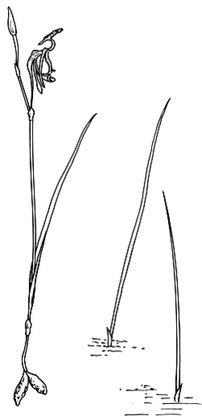Common Name: Duck orchids
Synonyms: Paracaleana APNI*
Sullivania F.Muell. APNI*

Description: Terrestrial herbs, sympodial; roots filamentous; tubers produced at apex of stolons.
Leaves ± suffused with purple, basal, 1 per shoot, convolute, sessile.
Inflorescence racemose, 1–5-flowered, terminal; flowers not resupinate. Dorsal sepal free, about as long as lateral sepals. Lateral sepals free. Lateral petals free, about as long as dorsal sepal. Labellum free, attached by an elastic, irritable claw, which is upcurved when set, recurved when sprung; lamina peltately connected to the claw, shaped like a duck's head (in C.major) and smooth, ornamented "at the back of the head" with a single, flat, downward-curving, strap-like appendage; or lamina peltately connected to the claw, lageniform (flask-shaped) compressed and warty over the whole surface [or warty only at apex (in C. minor); when touched the labellum abruptly folds into the cup-like column. Column lacking free filament and style; column wings broad and continuous along the whole length of the column, forming a concave, cup-like basket. Column foot absent (C. major) or present (C. minor). Anther erect, persistent. Pollinia 4, soft and mealy. Stigma entire. Rostellum obscure, ventral.
Distribution and occurrence: World: 14 species, all in Australia and endemic except C. minor which is also known from New Zealand; all States.
Paracaleana was segregated from Caleana by D.F. Blaxell (1972, Contributions from the NSW National Herbarium 4: 275–283) but in Flora of NSW vol. 4, we followed M.A. Clements (1989, Australian Orchid Research 1) in not recongising this split on the grounds that it was an unnecessary nomenclatural change. However, since 1993, the generic name Paracaleana has come into common useage, and NSW recognised it as distinct from its sister group, the monotypic Caleana (P.H. Weston, March 2007). In 2014 a phylogenetic study based only on nuclear ITS resolved Caleana and Paracaleana in a fully supported monophylum separated from other genera by a relatively long branch. Within the crown group Caleana major was sister to a lineage containing the three sampled Paracaleana species (Miller & Clements 2014), branch lengths separating species were relatively short, and relationships at times poorly supported, suggesting recognition of a single genus, circumscribed sensu Brown (1810), is appropriate.
Text by P.H. Weston, updated by M.A.M. Renner (1 Nov 2019).
Taxon concept: S.D. Hopper & A.P. Brown (2006) Australian Systematic Botany 19: 211–244 (Paracaleana). J.T. Miller & M.A. Clements (2014) Molecular phylogenetic analyses of Drakaeinae: Diurideae (Orchidaceae) based on DNA sequences of the internal transcribed spacer region. Australian Systematic Botany 27: 3-22 (Caleana sens. lat.)
| | Key to the species | |
| 1 | Surface of labellum lamina smooth; column foot absent | Caleana major |
| Surface of labellum lamina covered in shining, black, calli; column foot present, separating the points of insertion of the labellum and lateral sepals from those of the dorsal sepal and lateral petals | Caleana minor |
|


